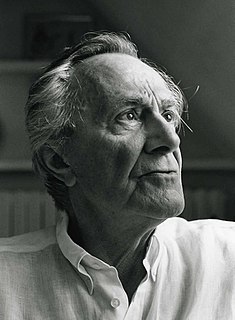A Quote by James Joyce
Let us leave theories there and return to here's hear.
Related Quotes
Sunday morning, before we go to hear the Word of God preached...let us not rush into God’s presence careless, reckless, and unprepared, as if it mattered not in what way such work was done. Let us carry with us faith, reverence, and prayer. If these three are our companions, we will hear with profit, and return with praise.
This is what life is about. It is being sent on a trip by a loving God, who is waiting at home for our return and is eager to watch the slides we took and hear about the friends we made. When we travel with the eyes and ears of the God who sent us, we will see wonderful sights, hear wonderful sounds, meet wonderful people ... and be happy to return home.
I remember that one time Carl Sagan was giving a talk, and he spelled out, in a kind of withering succession, these great theories of demotion that science has dealt us, all of the ways in which science is telling us we are not who we would like to believe we are. At the end of it, a young man came up to him and he said: "What do you give us in return? Now that you've taken everything from us? What meaning is left, if everything that I've been taught since I was a child turns out to be untrue?" Carl looked at him and said, Do something meaningful.
The nineteenth and twentieth centuries have given us as much terror as we can take. We have paid a high enough price for the nostalgia of the whole and the one, for the reconciliation of the concept and the sensible, of the transparent and the communicable experience. Under the general demand for slackening and for appeasement, we can hear the mutterings of the desire for a return of terror, for the realization of the fantasy to seize reality. The answer is: Let us wage a war on totality; let us be witnesses to the unpresentable; let us activate the differences.
God allows and at times causes us to go through the kinds of circumstances that strip away all falsehood and leave us with our real selves. God's ultimate intent is not to leave us faithless, but to leave us faith-full. There are few things as exhilarating as going through the fire and finding that you had the resilience to make it through. All of us wonder at times whether we have what it takes. God wants to bring us to a place where we have no doubt of the work He has done within us.
Then he exploded. "No!" he said. That familiar injunction. I'd heard it so many times. "No. I cannot take this steel. It would not be correct." He opened his knife drawer. "It goes here," he said, "until you return."(That's how you leave: by never saying good-bye.)And I learned that: to return. I came back the following year and the year after that. I hope to return every year (after all, I may never have the chance to learn so much), until I have no one to return to. (301)







































